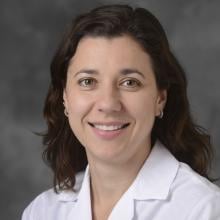As a medical student, do you ever wonder what it’s like to specialize in sleep medicine? Meet Virginia Skiba, MD, a sleep medicine physician and a featured doctor in the AMA’s “Shadow Me” Specialty Series, which offers advice directly from physicians about life in their specialties. Check out her insights to help determine whether a career in sleep medicine might be a good fit for you.
The AMA Specialty Guide simplifies medical students’ specialty selection process, highlights major specialties, details training information, and provides access to related association information. It is produced by FREIDA™, the AMA Residency & Fellowship Database®.
Learn more with the AMA about the medical specialty of sleep medicine.
“Shadowing” Dr. Virginia Skiba
Specialty: Sleep medicine.
Practice setting: Group practice.
Employment type: Employed by Henry Ford Medical Center in Sterling Heights, Michigan. Henry Ford Health is a member of the AMA Health System Program, which provides enterprise solutions to equip leadership, physicians and care teams with resources to help drive the future of medicine.
Years in practice: 21 total, but 10 in sleep medicine.
A typical day and week in my practice: I work about 40–45 hours per week in an outpatient clinic. I spend the majority of this time seeing patients. I also read sleep studies for one to two hours per day. Many days, I have sleep-medicine fellows—as well as residents from various specialties—rotating with me. Some days, I have administrative time to address various operational aspects of our sleep laboratories and clinic flow, work on a research project or give lectures.
The most challenging and rewarding aspects of sleep medicine: I find it most challenging to work with patients who are not invested in their health and well-being, but I also find it very rewarding to be able to follow patients over the years, see their journeys and help them through challenges. It is so humbling to be part of their lives, meet their families and often have their family members and friends referred to us as new patients.
The impact burnout has on sleep medicine: Our specialty has seen a lot of disruptions over the years, such as changes in sleep-testing payment and challenges with positive airway pressure device safety and availability. We must always be aware of the next disruption, which can also be an opportunity to further our field and help our patients and society.
For me, service outside the clinic helps with burnout. I have been involved in various societies where I have a chance to meet other physicians. I am currently working with our state sleep society on raising awareness of the benefits of later school start times for our middle school and high school students.
How Henry Ford Health is reducing physician burnout: Our health system provides a lot of resources, such as mentoring, counseling and finding ways to improve our efficiency.
How my lifestyle matches, or differs from, what I had envisioned: I used to practice general neurology, where the clinic was more demanding, and I had to take hospital call frequently. I knew that I would not be able to sustain that lifestyle for long. Sleep medicine is an outpatient specialty with stable work hours. This enables me to have predictability in when I can be home and involved with my family and also pursue other interests.
Although most patients we see have sleep apnea, many have other sleep disorders. Every patient is unique, with their own particular challenges.
I also perform a lot of administrative duties for our division, work with various specialties on education and get involved with several societies’ conferences and other projects. This extra work brings additional meaning to my career.
Skills every physician in training should have for sleep medicine but won’t be tested for on the board exam: Good history taking is key in our field. I encourage physicians to use open-ended questions, but a lot of people do not realize many symptoms are related to sleep and asking direct questions is also key.
It is especially important to keep an open mind. Sleep is such a personal and often vulnerable state that many people are not used to talking about. It is also important for me to know the bigger, “Why.” Why is the patient worried about their symptoms? For example, are they embarrassed about the snoring, or do they know somebody who died in their sleep? Knowing the why helps us motivate patients to pursue better sleep health.
One question physicians in training should ask themselves before pursuing sleep medicine: Are you looking for stable, predictable days but also lots of opportunities for growth? I find sleep medicine to be a very rewarding field. I like knowing what to expect in my workdays but also having opportunities to advance our field.
Books, podcasts or other resources every medical student interested in sleep medicine should be reading: Find one or two sources for updates in medicine and in your field, but also read and listen to what interests you outside of medicine. I enjoy learning about space and nonbiological sciences. I also enjoy dog-training sports.
The American Academy of Sleep Medicine (AASM) has several resources on sleep medicine and pathways to sleep medicine on their website.
“Talking Sleep” is a podcast put together by AASM that discusses the latest advances in our field. It is quite easy to listen to and has great information.
Additional advice I would give to students who are considering sleep medicine: Our field is not well-known to medical students or residents, partly because it does not belong to any one specialty. You can go into sleep medicine from neurology, like I did, or from internal medicine, family medicine, pediatrics, psychiatry or otolaryngology. You may need to seek out opportunities to do a rotation to get a better feel for what this specialty is like.




